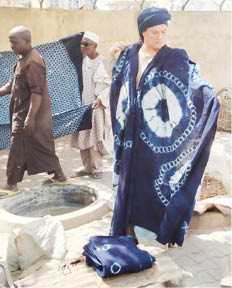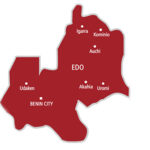The 500-year-old dyeing industry in northern Nigeria’s commercial city of Kano is facing extinction due to a record drop in patronage by western tourists, regional traders, as well as high rush for foreign materials, usually from China into the Nigerian market, Daily Trust Saturday reports.
Malam Mamuda Uba has been in the local dyeing business for decades while his family has been doing it for centuries. While his dedication to the trade has changed a little, customers’ interest has changed significantly.
The Kofar Mata dyeing pits, located at the foot of the city wall, served the purpose of attracting travellers and traders across the Sahel countries to Kano, thus making it one of the most thriving cities in West Africa.
“Western tourists, traders from all over the country, neighbouring Niger, Mali and Chad visit the dyeing trunks to buy local fabrics, among others,” he said as he sank a cotton cloth into a brew of water, indigo, ash and potassium.
- Kano children’s parliament breaks fast with Almajiris
- Meet 28-year-old Makera who redesigned Kano demolished roundabout
As he pulled out a deep blue garment, he told Daily Trust Saturday that “customers used to be plenty here, but now, they rarely come.”
The pits have served as a first port of call to national and international guests and tourists who visited Kano on either official or personal engagements.
While Kano has dealt with social unrest, particularly the Boko Haram insurgency, it is presently enjoying relative peace.
Daily Trust Saturday reports that violence in the North West, especially kidnapping for ransom by bandits, has scared away investors and tourists as many embassies have advised their citizens against travelling to the region.
Uba, who is the Sarkin Karofin Kofar Mata, literally meaning the Emir of Karofi, said that over the decades, the centre had been a tourist destination from the West, who not only visited but also patronised the products, which made the business thrive best.
“We only receive occasional visits by tourists from European countries. Even those who used to come from African countries rarely visit us due to insecurity in the region,” he further lamented.
Families own each of the 144 pits, and ownership has been passed down through generations. But many lie abandoned and filled with trash.
Those who work at the pits say that without peace in the North, there’s little chance that the dyeing pits will become profitable again anytime soon.
Founded in 1498, the Kofar Mata pits are said to be the oldest in Africa and the largest among the few survivors of Kano’s dyeing trade. Its colours have also adorned the fabrics of Kano’s traditional rulers for centuries.
Daily Trust Saturday learnt that the founders of the Kofar Mata dyeing pits were the earliest and smartest businessmen of Kano city. They cleverly set up this industry in a time when even the western world was yet to be industrialised. The pits have played a meaningful role in economising the business community of Kano during its time.
As patronage dwindles from the dyeing pits, many successors of the tradition appeared to have abandoned it for government jobs and other businesses instead, forgetting the skills passed down through generations.
The Sarkin Karofi told Daily Trust Saturday that, “This negative trend has forced many families who inherited the business to abandon it, some of whom have attended school up to university level and took up cleaning jobs elsewhere instead of the dyeing business.”
The heirs of the great profession lamented that the business was no longer as lively as it was in the past. So, the younger generation has no option but to seek subsistence somewhere. One of them, Muhammad Sani, said he had been in the business since childhood but had to abandon it to pursue education to the university level, which he completed and is currently in government employment.
“Even when I was an undergraduate, I used to come here to dye and get some money for my transportation to school and other needs. But having gotten a new job, I hardly come here,” he said.
When the business was booming, there were about 270 dyeing pits in Kofar Mata Kano, with thousands of workers comprising men and women, the young and the old. It was one of the major backbones of the state’s economy. Then, the famous guinea brocade and a good chunk of clothes patronised by the high and mighty were dyed at the pit.
Another dimension to the declining fortune of the five-century-old industry is the intrusion of the Chinese into the dyeing business as the foreigners were allowed to import low and cheap quality fabrics made from plastic fabrics instead of cotton into Nigeria.
“The Chinese merchants work freely in our market places, selling low quality textile materials. They are also into the business of Shadda brocade dyeing. This has impacted seriously on the traditional dyeing industry,” said Haruna, who works with one of the state government agency.
Due to the subsiding demand and high inrush of foreign materials from China into the Nigerian market, more than 100 pits have fallen into dilapidation and many of them are occluded with muck and stone.
Also, a visit to Kurmi Market, the oldest market in the sprawling ancient by Daily Trust Saturday indicated that fewer products from the dyeing industry were seen on display, some even hidden and only brought out on demand.
It was also observed that importation of modern chemicals for the dyeing of clothes is also posing a threat to the local dyeing industry.
At one of such centres visited by our correspondent at Mangwarori, Sabon Titi in Kano, Shadda brocades of various colours were being dyed, using different coloured chemicals, apparently in sharp contrast to the local process that uses locally sourced ingredients.
Nura Roja, one of the dyers, believes that people patronise their services because it is more qualitative than the traditional one.
“I think the traditional dye has its peculiarity, in the sense that it is meant for a particular purpose and for a class of people like the Tuareg of Niger and Mali, as well as traditional attires worn by horse riders during festivities,” he said.
He said although they had also been affected by the Chinese textile materials that have flooded the market, he didn’t see their process in anyway affecting the functions of traditional dyeing industry.
However, a dealer of the dyed Shadda and Kamfala brocades at Kantin Kwari Textile Market, Muhammad Ahmad Ibrahim partly blames unpatriotic businessmen in the market for siding with the Chinese to bring in their cheap but low quality products.
“In the past, there was stiff resistance to allow the Chinese do dealership business in the market. However, they changed their approach by buying quality samples of Shadda brocades, which they took to their country and come back with low quality products and use the same unpatriotic dealers to sell them on their behalf.
“Our people are also patronising the Chinese products because they are cheaper and affordable, particularly in the face of prevailing economic situation in the country,” he lamented.
Some of the industry players blame the government for not adequately supporting them through providing a decent working environment, encouraging massive production, as well as buying the products for export.
However, the managing director of the Kano State Tourism Board, Tukur Bala Sagagi, said plans were in the pipeline to help revive the ailing industry in the state.
He said the board had submitted a detailed proposal to the state government for the release of fund to turn around the fortunes of the enterprise.

 Join Daily Trust WhatsApp Community For Quick Access To News and Happenings Around You.
Join Daily Trust WhatsApp Community For Quick Access To News and Happenings Around You.


